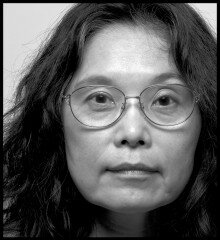Nederlands ►

Hiromi Itō, born in 1955 in Tokyo, is one of the most important and highly regarded poets in Japan. Since her sensational debut in the late 1970s as a free-spirited and intelligent female poet with shamanisitic qualities, Ito has published more than 10 collections of poetry including such monumental works as Oume (Green Plums, 1982), Watashi wa Anjuhimeko de aru (I am Anjyuhimeko, 1993), and Kawara Arekusa (Wild Grass upon a Riverbank, 2005) which won the prestigious Takami Jun Award.
She has also written a dozen essay collections on such diverse topics as child-rearing, foliage plants and English lessons, collaborated with the photographer Nobuyoshi Araki and the feminist critic Chizuko Ueno, creatively translated the medieval Buddhist stories and a 19th-century novel into modern Japanese, and published novellas, two of which were the finalists for the Akutagawa Prize, the Japan’s most prominent award for literary fiction.
Itō has been consistently expanding her creative spheres over the last decades: from the relationship between the sexes, motherhood, the oral traditions of Native Americans, and pop songs from the 1960s, to the lifecycles of plants, just to name a few. As the critic Nobuaki Tochigi points out in the attached article, “she is an omnivorous poet who can transmit and transform a variety of literary legacies”.
But whatever she writes in whatever form, one can always recognise qualities that are unquestionably hers, qualities that remind us of the wandering minstrels in Medieval Japan who delivered their poems by voice alone and not by written text. She seems to be obsessed with moving, both in her real life and in her narratives, and with the voices that “just come out and fade away”. After having left Tokyo for Poland and then for Kumamoto in Southern Japan, Ito now lives in California, writing in Japanese and visiting Kumamoto frequently.
In this issue of Poetry International Web Japan, we are pleased to introduce the first two chapters of Kawara Arekusa (Wild Grass upon a Riverbank), which is her latest and undoubtedly the most important work, with an English translation by Jeffrey Angles. While it shows only a part of the 140-page epic poem, the above-mentioned essay by Nobuaki Tochigi should be helpful in giving an overview of this “masterpiece compilation of the tales and songs which she has created over the past 15 years”.
We are also posting Itō’s own readings of Watashi wa Anjyuhimeko de aru (I am Anjuhimeko) both in the original Japanese and in the English translation by herself as an audio file. Jeffrey Angles, who has also translated the book-long series of these prose-poems, wrote as follows:
“The poem Watashi wa Anjuhimeko de aru represents a reworking of an oral text recorded from a shamaness in northern Japan in 1921. The story collected from the shamaness, in turn, represents an alternative variation of the famous medieval legend of Sansho Dayu (Sansho the Bailiff), which many Japanese artists… have used as the basis for novels and films. In reworking the text collected from the shamaness in 1921, Itō has drawn upon her knowledge of feminist psychology and incorporated references to Japanese folklore and the Shinto creation myth from the eighth century Kojiki (Record of Ancient Matters).”
Also available here are her shorter verses, an autobiography and a selected bibliography. We hope you will enjoy the exciting world of Hiromi Itō!
Hiromi Itō was first featured on PIW in 2006. In 2010, she was a guest at the 41st Poetry International Festival.
Audio recordings of the poet
I am Anjuhimeko (mp3)
Poetry Talk: Hiromi Ito and Yasuhiro Yotsumoto
Selected Bibliography
Poetry
Kusaki no Sora (The Plants and the Sky). Tokyo: Atelier Publishing Planning, 1978
Princess. Tokyo: Shiyosha, 1979
Collected Poems of Hiromi Ito: New Generation Poets Series. Tokyo: Shichosha, 1980
Oume (Green Plums). Tokyo: Shichosha, 1982
Territory-Ron 2 (On Territory 2). Tokyo: Shichosa, 1985
Territory-Ron 1 (On Terriory 1). Co-authored with Nobuyoshi Araki. Tokyo: Shichosha, 1987
Collected Poems of Hiromi Ito: Contemporary Poetry Series. Tokyo: Shichosha, 1988
Noro to Saniwa (Noro and Saniwa). Co-authored with Chizuko Ueno. Tokyo: Heibonsha, 1991
Watashi wa Anjuhimeko de aru (I am Anjuhimeko). Tokyo: Shichosha, 1993
Te, Ashi, Niku, Karada (Hand, Foot, Flesh, Body). Co-authored with Miyako Ishiuchi. Tokyo: Chikuma Shobo, 1995
Kawara Arekusa (Wild Grass upon a Riverbank). Shichosha: Tokyo, 2005
Anthologies in English
other side river. Edited and trans. Leza Lowitz and Miyuki Aoyama. California: Stone Bridge Press, 1995
Poetry in English Translation
Killing Kanoko: Selected Poems of Hiromi Ito. Translated by Jeffrey Angles. Notre Dame, IN: Action Books, 2009.
Poetry & Essays in German Translation
Mutter tötten, Trans. Irmela Hijiya-Kirshnereit. St. Pölten, Austria: Residenz verlag GmbH, 1997
Das anachische Aschenputtel: Märchen als Medizin für den Hausgebrauch. Trans. Richmod Bollinger and Yoriko Yamada-Bochynek. St. Pölten, Austria: Residenz verlag GmbH, 1999
Essays
Yoi Oppai, Warui Oppai (Good Breasts, Bad Breasts). Tokyo: Tokisha, 1985
Onaka, Hoppe, Oshiri (Tummy, Cheek, Bottom). Tokyo: Fujin Seikatsusha, 1987
Katei no Igaku (Family Medical Guide). Co-authored with Masahiko Nishi. Tokyo: Chikuma Shobo, 1995
Nani Tabeta? (What did you eat?). Co-authored with Naomi Edamoto. Tokyo: Magazine House, 1999
Ito Fukigen Seisakusho (Ito Ill-Temper Factory). Tokyo: Mainichi Newspaper, 1999
Love Song. Tokyo: Chikuma Shobo, 2004
Let’s Speak English. Tokyo: Iwanami, 2005
Midori no Obasan (Mrs. Green-Thumb). Tokyo: Chikuma Shobo, 2005
Fiction
Kazoku Art (Family Art). Tokyo: Iwanami, 1992
la nina (the 21st Noma Literature Award). Tokyo: Shinchosha, 1999
Nihon no Fushigi na Hanashi (Miraculous Stories from the Japanese Buddhist Tradition). Tokyo: Asahi Newspaper, 2004
Nacchan no Natsu (The Summer of Nacchan) Co-authored with Ken Katayama. Tokyo: Fukuinkan, 2004
Translations
Nigorie, a 1895 novel by Ichiyo Higuchi. Translated by Ito into modern Japanese. Tokyo: Kawadeshobo Shinsha, 1996
Billy Joe no Daichi (Original Title: Out of the Dust by Karen Hesse) Tokyo: Rironsha, 2001
11 no Koe (Original Title: Witness by Karen Hesse Tokyo: Rironsha, 2003





